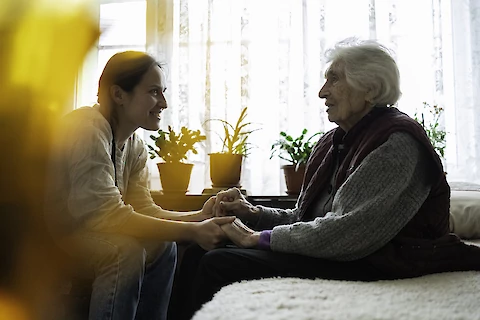
Experiencing a first heart attack is a significant medical event that can have far-reaching effects on an individual's physical and emotional well-being. While much attention is rightfully focused on the physical recovery process, the potential impact on mental health, especially among seniors, should not be overlooked.
As we observe American Heart Month this February, let’s explore the mental health issues often arising after such a significant health event, how changes in daily routines may impact their mental health, and strategies for navigating these challenges.
The Link Between Heart Attack and Mental Health
The connection between a heart attack and mental health is profound. Following such a significant health event, individuals, especially seniors, often experience heightened levels of anxiety, depression, and post-traumatic stress disorder (PTSD). The fear of recurrence, lifestyle adjustments, and physical limitations can contribute to emotional distress. Furthermore, social isolation and loneliness may exacerbate these mental health concerns. Recognizing and addressing these issues is crucial for holistic recovery.
Common Mental Health Issues Post-Heart Attack
There are a few mental health issues that pop up for many seniors after a heart attack. These include:
Depression
Depression is one mental health issue that commonly manifests after a heart attack. Symptoms may include persistent feelings of sadness, loss of interest in activities previously enjoyed, and difficulty sleeping. Studies suggest that up to one-third of heart attack survivors develop depression.
Anxiety
Anxiety, particularly related to the fear of another heart attack, is also highly prevalent among heart attack survivors. They may find themselves excessively worried about their health and obsessing over potential symptoms.
Post-Traumatic Stress Disorder
Post-Traumatic Stress Disorder, or PTSD, can also develop after a traumatic event like a heart attack. Symptoms include re-experiencing the trauma through flashbacks or nightmares and avoiding places or situations that trigger memories of the event.
Impact on Daily Routines and Mental Health
Following a heart attack, there are often significant alterations to a person's daily routine. These changes might encompass reduced physical activity, dietary adjustments, or an increased dependence on others. These deviations from the norm can lead to feelings of frustration, helplessness, and sadness, which can further contribute to mental health issues.
However, it should be noted that even a mild heart attack that doesn't cause severe changes in everyday routine can still result in mental health changes. The very experience of a heart attack can be enough to cause emotional distress, emphasizing the need for mental health care in all such instances.
Importance of Caregiver Support
Caregivers play a critical role in monitoring and managing the mental health of a heart attack survivor. By observing changes in behavior or mood, caregivers can help identify early signs of mental health concerns. If such issues are suspected, it's crucial to seek professional help promptly to prevent further complications.
Senior Helpers Charleston Supports Seniors With Their Mental Health Issues
Understanding and addressing mental health concerns following a heart attack is crucial for a healthy recovery process. It is vital for caregivers to be aware of the potential physical and emotional changes that a heart attack can trigger.
For those living in Mt. Pleasant, Daniel Island, Charleston, and surrounding areas, don't hesitate to reach out to Senior Helpers Charleston for support. Our team is ready to assist you and your senior loved ones in navigating the journey to recovery, ensuring that mental health concerns are addressed promptly and appropriately. Remember, holistic care, taking into account both physical and mental health, is key to full recovery after a heart attack. Contact us today.